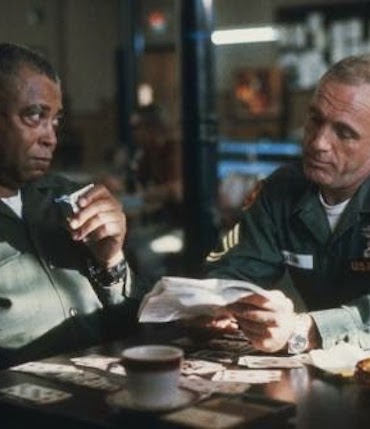Sunday, May 10, 1987
GARDENS OF STONE. Written by Ronald Bass, based on the 1983 novel by Nicholas Proffitt. Music by Carmine Coppola. Co-produced and directed by Francis Coppola. Running time: 110 minutes. Rated Mature with the B.C. Classifier’s warning "some very coarse language.”
THE OLD GUARD LIVES FOR the dead. In Vietnam, there's a combat unit that boasts "killing is our business and business is good," Sgt. Clell Hazard (James Caan) tells recruit Jackie Willow (D.B. Sweeney).
Well, "burying is our business," Hazard says grimly. "Our business is better."
The army's official ceremonial regiment, the 3rd U.S. Infantry (The Old Guard) operates out of historic Fort Myer, Va. Its members form the honour guards for funerals at the Arlington National Cemetery.
Though qualified for this special-duty unit, Willow is a young man determined to prove himself in battle. A soldier and the son of a soldier, he didn't join the army to tend its Gardens of Stone.
Director Francis Coppola is no stranger to the 'Nam. One of the first filmmakers to respond seriously to the conflict, he set the standard for Vietnam war movies with his phantasmagorical Apocalypse Now (1979).
Now, in Gardens of Stone, Coppola turns his attention to the home front. The time is 1968 and, in the words of First Sgt. Tom "Smasher" Williams (Dick Anthony Williams): "'Nam makes death a real growth industry."
At the centre of this unfortunate industry are a pair of intelligent, professional sergeants. Both Clell Hazard and his lifelong friend, Sgt.-Maj. "Goody" Nelson (James Earl Jones), believe that the Southeast Asian war is a major mistake.
They're agreed that "there's nothing to win, no way to win it." Predictably, such opinions don't sit well with their unit commander, Capt. Homer Thomas (Dean Stockwell).
"We're middle management," the officer says. As long as they wear the uniform, men like Hazard have no right to dissenting opinions.
For his own part, Hazard has never viewed the army as a corporation. For him it is his family. Service to the nation is his family's business.
Under Coppola's direction, screenwriter Ronald Bass's adaptation of Nicholas Proffitt's novel is the story of a family in crisis. Like John Ford, Coppola presents his soldiers as members of a clan that seeks, first and foremost, to protect its own.
Like the Corleones, the Mafia family in Coppola's classic Godfather films, the army is involved in a violent business. What troubles Hazard is the fact that, in Vietnam, the family business is being handled badly.
Like Willow, Hazard has no desire to be one of "the nation's toy soldiers." What he wants is a transfer to Fort Benning where he can train men not to bury their comrades, but to survive and come home.
In Apocalypse Now, Coppola vigorously portrayed the insanity of the war. His picture plunged us into the "heart of darkness," both visually and emotionally.
With Gardens of Stone, he pays dramatic tribute to the essential decency that tragedies like Vietnam test and shape. A more intimate and cerebral feature, it offers a succession of familial moments —courtships, dinners, weddings and funerals — to drive home its point.
The above is a restored version of a Province review by Michael Walsh originally published in 1987. For additional information on this archived material, please visit my FAQ.
Afterword: Here’s a fun fact. Apocalypse Now, the greatest of the Vietnam war movies, was also the first full feature film credited to “Francis Coppola.” Gardens of Stone, the director’s return to the subject of that war and its aftermath, was the last. (Yes, he used the two-name credit for his contribution to the1989 anthology New York Stories, but its 33-minute running time was well short of feature length, and so, technically, not a feature film.)
With the release of his next full feature, 1988’s Tucker: The Man and His Dreams, the Ford was back on screen. Additional fun fact: The subject of that film, Preston Thomas Tucker, was a Detroit engineer who set out to re-invent the auto industry. A quixotic comedy-drama based on a true story, it had been a dream project of the Detroit-born Coppola from his film schooldays in the 1960s. When it finally got made, it was oh, so easy to see its tale of a magnificent entrepreneurial failure as a metaphor for the director’s own failure to create a new Hollywood with his independent Zoetrope Studios. At the time, it was thought to be his last film, with the then-49-year-old director fading into retirement.
Then came 1990’s The Godfather: Part III. Seven more pictures followed, none a blockbuster hit. Currently, he is working on a self-financed, $100-million project, a science-fiction romance called Megalopolis. It’s scheduled to begin filming this fall. Francis Ford Coppola turns 83 today (April 7).
Today’s package: The five Francis Coppola features we’re adding to the Reeling Back archive are his 1982 modern musical One from the Heart, his two teen dramas, The Outsiders and Rumble Fish (both 1983), a period musical The Cotton Club (1984) and the drama Gardens of Stone (1987).
See also: Already in the archive are Francis Ford Coppola’s The Godfather (1972) and The Godfather: Part II (1974); The Conversation (1974), Apocalypse Now (1979), Peggy Sue Got Married (1986) and The Godfather: Part III (1990). Finally, there is my 1979 interview with the director.
